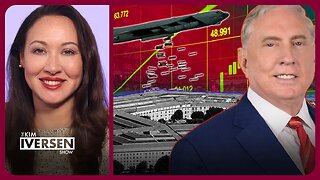Premium Only Content

The Freemason Story of Andrew Jackson: His hate for Indians and Banks
The Freemason Story of Andrew Jackson encompasses his life, political career, controversies, and connections within the Freemasonry. Born into hardship, Jackson rose swiftly in politics, becoming President and advocating for a strong executive branch. His clash with the National Bank led to its dissolution, which was fueled by his distrust of centralized banking favoring elites over the common people.
Jackson's policy on Indian removal, notably the Indian Removal Act of 1830, forcibly relocated Native American tribes, leading to the tragic Trail of Tears and the loss of land, culture, and lives. This act remains a dark chapter in American history, highlighting governmental disregard for Native American rights.
Jackson's relationship with Davy Crockett, both Freemasons, showcased differing political views, notably on Indian removal and the national bank. Jackson's presidency and decisions left a complex legacy, celebrated for leadership yet criticized for policies causing suffering to Native Americans.
Regarding his actions, opinions remain divided. Some view his attack on the National Bank as justified, aiming to decentralize economic power. However, his Indian removal policy is widely condemned today for its devastating impact on Native American communities.
In contemporary times, a president attempting similar actions as Jackson's Indian removal policy would likely face immense opposition, legal challenges, and international condemnation. Society's greater awareness of human rights and ethical considerations would heavily scrutinize such actions.
The Old Fashion Masonic Podcast delves into Freemasonry, exploring historical figures like Jackson, their affiliations, and their impact on society and politics. If you're interested in Freemasonry and historical perspectives, subscribing to the podcast would provide deeper insights into these topics.
-
 20:01
20:01
Old Fashion Masonic Podcast
1 year agoJames Naismith; Inventor of Basketball and a Masonic Hero Thief? S2 E71
261 -
 LIVE
LIVE
RiftTV
2 hours agoCON INC: We Should All Just FORGET About Epstein | The Rift | Dinesh D’Souza, Lauren Witzke + More
606 watching -
 58:21
58:21
BonginoReport
3 hours agoTrump Deepens MAGA’s Epstein Divide - Nightly Scroll w/ Hayley Caronia (Ep.91) - 07/16/2025
110K53 -
 LIVE
LIVE
RalliedLIVE
5 hours ago $0.85 earned10 WINS WITH THE SHOTTY BOYS
89 watching -
 LIVE
LIVE
Playback Request Live
1 hour agoLevel Up: Our First Live Performance ft. Lady Desiree
73 watching -
 LIVE
LIVE
Blabs Games
29 minutes agoBig Bad Uno Plays | Noob Plays
32 watching -
 LIVE
LIVE
The Jimmy Dore Show
1 hour agoTrump Attacks His OWN Supporters As Democrat Dupes Over Epstein! Columbia University CAVES to Trump!
7,864 watching -
 1:25:13
1:25:13
Kim Iversen
3 hours agoColonel Macgregor: The Pentagon Has No Strategy, Only Targets
70.8K51 -
 12:32
12:32
JapaNomad - Video Tours
13 hours agoR35 GT-R POV Drive in Tokyo 🗼Shinjuku | Pure Car ASMR | No Music | No Voice | 4K HDR
3.18K2 -
 24:23
24:23
Jasmin Laine
4 hours ago“Trump Was RIGHT”—Carney CAVES, Then CBC Host Gets SLAPPED With Brutal Truth
3.85K12